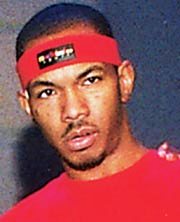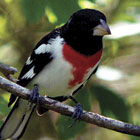
Chink Santana
Whenever I make a movie, I create a Google Alert with the same name. Mostly it’s amusing to see the random places the movie is talked about. But because my last movie is titled, Chink, I’ve been amazed by how frequently the word is used in racist and (apparently) non-racist ways.
According to the Google Alerts, the most common usage of the word “chink” is “chink in the armor” or some derivative of that cliché. But every once in a while, the word comes up in the most unexpected places.
For example, there are a lot of rappers who use the word “chink” in their names. Here is a list:
There are probably more, but I think you get the point. Obviously, Chink Santana is the most famous of these guys. But for the life of me I can’t figure out who or why they use the name “chink” at all. First I thought maybe there is a definition for the word that I wasn’t aware of. According to Merriam Webster.com, “chink” means:
1: a small cleft, slit, or fissure <a chink in the fence2: a weak spot that may leave one vulnerable <his lawyers found a chink in the law>3: a narrow beam of light shining through a chink
None of these are very cool or gangsta. The best hip hop related usage I could fine was this obscure Urban Dictionary definition:
chinked out: The act of smoking marajuana. Stoned, ripped, twisted.
“Man i can’t handle getting this chinked out, i feel like my brain is melting.”
But to be fair, that’s the fifth definition on Urban Dictionary. The more commonly accepted definition of “chinked out” (if there could be such a thing) is:
It`s a kind of music created by Wang Leehom (Asian Singer) who incoprates east and west sounds to his music. he make this kind of music since 2004 in his album “Shengri-la” he incoporates hip hop,R&B pop with tibet,and other asian music. in his new album “Heroes OF Earth” Released in 2006 got pekin opera on it If you want to heard leehom chinked-out music serch in youtube:
Leehom
Chinked-Out
Shengri-La
Heroes Of Earth
I would have loved to have been there at the genesis of their rap names. I wonder if anyone told them that it was racist term usually referred to Asian people, specifically Chinese people. And I also wonder if a fan has ever asked them if they were in fact Asian.
But rappers aren’t the only who have taken on the name. Apparently, this guy’s nickname was Chink:
But he’s not the only one. Here are a few others:
Apparently, “chink” was once a very common nickname (for non-Asians).
But naming something “chink” isn’t limited to people. There is also a show horse named Chinks:

A football stadium in Jacksonville named: Chink Lott Stadium.
Of course Chink’s Steaks in Philly:
And I would never have guessed this but this bird chirps chink too or rather, “Chink-Chink-Chink.”

I’ve also learned that chink, when referring to log cabins, is a certain way to build them. This is how to chink a log cabin:

There was a graphic novel that almost came out with the title: Iron Chink. It was in reference to “a mechanized 1900s salmon gutting and cutting machine. The name reflected the racist attitudes of the time, whereupon the Chinese cannery workers were laid off and replaced by this mechanized fish butchering machine.” The name of the graphic novel was changed. (It should be noted that the author is Asian Canadian.)

I’m probably the only one who finds all of this interesting.
But I don’t want to make it seem that all my “chink” Google Alerts are so benign. Take for example this idiot in the Canadian Football League. He recently Tweeted:
And here is his apology:
I don’t believe for a second he didn’t know what chink meant. I wish people would own their racism and just admit to it for once. I hate these fake apologies and/or fake explanations. I respect an openly racist more than one who pretends not to be racist.
My next Google Alert will be “Jap.” I’m pretty sure there won’t be nearly as many interesting links but you never know. I would never have guessed the various ways “chink” comes up on the Internet. I’ll let you know if anything interesting pops up.
- Excited
- Fascinated
- Amused
- Disgusted
- Sad
- Angry








